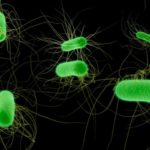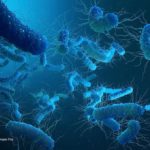CSPI (Center for Science in the Public Interest) and Consumer Reports want the government to ban Red Dye #3 for several reasons, mostly because the FDA has found the additive causes cancer in laboratory animals. Those organizations, along with other consumer advocate organizations, petitioned the FDA to ban this ingredient on October 24, 2022. Now they are asking the public to sign a petition to help. According to federal law, a color additive "shall be deemed unsafe, and shall not be listed, for any use which will or may result in ingestion of all or part of such additive, if the additive is found by the Secretary to induce cancer when ingested by man or animal." And according to the Delaney Clause, the FDA can't find as safe the use of any additive that it has been found to induce … [Read more...]
Study Shows E. coli Toxin Accelerated Colon Cancer in Study Mice
A new study shows that an E. coli toxin accelerated colon cancer in study mice, raising the possibility that about two million new cases of colorectal cancer diagnosed every year around the world could originate from food poisoning, even if the cases are brief and mild. The study was conducted at Johns Hopkins University/Bloomberg School of Public Health and published in the January 12, 2022 issue of the journal Cancer Discovery. Certain E. coli bacteria produce a toxin that can damage DNA in intestinal cells. The novel genotoxin is called UshA. The mice studied are genetically susceptible to developing colon cancer, called ApcMinΔ716/+ types. UshA triggers DNA damage and initiates tumor transformation during infections both in vitro and in vivo. This type of infection could … [Read more...]
Some E. coli Strains May Be Linked to Development of Bowel Cancer
According to a new study in the journal Nature, E. coli infections may be linked to bowel cancer. Some species of the intestinal microbiota, which is the collection of bacteria and viruses that live in the human gut, have been associated with colorectal cancer, but a direct role hasn't been proven. As it turns out, E. coli bacteria carry what is called a pathogenicity island pks, that creates enzymes that synthesize a compound called colibactin. Colibactin causes double-strand breaks in cultured cells. This damage can lead to cancer over time. Colibactin is found more often in fecal samples of people who do have bowel cancer than healthy people. Scientists don't know how many cases of bowel cancer may be linked to the E. coli bacteria, but estimate that as many as 5% of these … [Read more...]
Research Shows Possible Link Between E. coli and Cancer
A new study from the University of Minnesota School of Public Health and Masonic Cancer Center, published in the journal Science, finds a possible association between E. coli and cancer. The scientists have determined how toxins produced by the pathogen interact with and damage DNA on the molecular level. Applications from this study may help doctors understand how toxins affect DNA, and may help them to develop tools to improve chemotherapy treatments. The main researchers are Silvia Balbo, School of Public Health assistant professor, and Peter Villalta, mass spectrometry services coordinator at Masonic Cancer Center. Support was provided by the National Institutes of Health and the National Cancer Institute. The method uses mass spectrometry to study how toxins interact with … [Read more...]
CSPI Wants Cancer Warning Label on Processed Meat
The Center for Science in the Public Interest (CSPI) is calling on the USDA to put a warning label on processed meat and poultry products telling consumers that eating those foods is associated with an increased risk of colorectal cancer. bacon, ham, hot dogs, and other processed products would have that label. The regulatory petition CSPI filed yesterday cites the findings of the International Agency for Research on Cancer, which found in 2015 that processed meat is "carcinogenic to humans." The study found that eating 50 grams per day of processed meat raises the risk of developing that particular kind of cancer by about 18%. A typical serving size of those meats is about 55 grams. Colorectal cancer is the second leading cause of cancer deaths in this country. It will cause … [Read more...]
Use High Heat to Cook Meat? Rethink That Technique
A new study published in the journal Cancer has found that cooking beef at high temperatures may lead to an increased risk of developing kidney cancer. Carcinogenic compounds are created in the meat when grilled, barbecued, and pan-fried. The study was conducted at the University of Texas MD Anderson Cancer Center. Renal cell carcinoma affects 60,000 new patients every year. About 14,000 people die of this illness every year in the Untied States. The incidence of this type of cancer has been increasing for decades. Dr. Stephanie Melkonian, Epidemiology postdoctoral fellow and lead author of the study said, "this study encourages us to look not only at what foods we're eating, but also how we're preparing those foods." When you cook meat with high temperature, causing charring on the … [Read more...]
WHO Finds Glyphosate “Probably Carcinogenic”
In March, scientists organized by the World Health Organization (WHO) found that the herbicide glyphosate, which is an active ingredient in Round-Up, is "probably carcinogenic to humans." Food and Water Watch, along with the Washington Office on Latin America (WOLA) are calling for an end to the U.S. backed program that sprays glyphosate on coca fields in Columbia. Adam Isaacson, senior associate for regional security policy at WOLA said, "there is now proof that the sprayings of glyphosate represent an unacceptable risk to the public. This has critical implications for a program that has been a cornerstone of U.S. drug policy in Colombia." The herbicide has been sprayed over more than 4 million acres in that country over the past 20 years. Glyphosate was considered safe for humans … [Read more...]
Early BPA Exposure Increases Prostate Cancer Risk
Food Poisoning Bulletin has been covering the story of bisphenol A (BPA), a chemical used to harden plastics, for years. Health risks associated with this chemical have been well known for some time. In fact, because of consumer pressure, all manufacturers of baby bottles have removed the chemical from their products. The FDA belatedly finalized a rule banning BPA in infant formula packaging last summer. A new study in the Journal of Endocrinology, published today, finds that BPA exposure early in life increase the risk of prostate cancer. Unfortunately, BPA is found "universally" in the umbilical cord blood of pregnant women, according to a study conducted in California last August. In the latest study, mice were implanted with human prostate stem cells from healthy males. The mice … [Read more...]
CSPI Downgrades Splenda from “Safe” to “Caution”
The Center for Science in the Public Interest (CSPI) is downgrading sucralose, which is the artificial sweetener commonly known as Splenda, from the "safe" category to "caution" after an unpublished Italian study found the chemical caused leukemia in mice. This is the same independent lab that found aspartame caused cancers in mice and rats. All previous long-term feeding studies of sucralose conducted on animals were performed by the chemical's manufacturers. UPDATE: CSPI has now downgraded Splenda from "Caution" to "Avoid." Unlike other artificial sweeteners, sucralose can be used in baking, since the compound doesn't break down at high temperatures. CSPI objected to sucralose from the beginning. In 2008, a study funded by the sugar industry found that Splenda reduces beneficial … [Read more...]
Ingredient in Roundup Weed Killer Found in Food
A peer-reviewed study from the Massachusetts Institute of Technology (MIT), published in Entropy, has found that residues of glyphosate, the main ingredient in the weed killer Roundup, have been found in food. Glyphosate is used on crops that are genetically engineered (GMO foods) to be "Roundup Ready". Monsanto scientists have claimed for years that Roundup is safe and non-toxic because it targets the shikimate pathway in plants, which is absent in animals. But this pathway is present in bacteria that live in human guts, which play an important role in human physiology, from immunity to synthesizing vitamins. The study's authors say that glyphosate does induce disease and is a "textbook example of exogenous semiotic entropy." Glyphosate inhibits detoxification of xenobiotics and … [Read more...]












